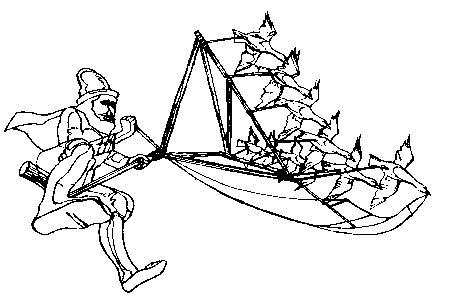 |
|||||
| Home | Research | For Teachers | HISTORY Level 1 Level 2 Level 3 |
PRINCIPLES Level 1 Level 2 Level 3 |
CAREER Level 1 Level 2 Level 3 |
| Gallery | Hot Links | What's New! | |||
| Web Administration and Tools | |||||
 |
|||||
| Home | Research | For Teachers | HISTORY Level 1 Level 2 Level 3 |
PRINCIPLES Level 1 Level 2 Level 3 |
CAREER Level 1 Level 2 Level 3 |
| Gallery | Hot Links | What's New! | |||
| Web Administration and Tools | |||||
![]()
 |
| Icarus in flight |
The magical ability to fly was often attributed to the Gods in Greek Mythology and legends. Oriental and Western folklore also abound with stories of magic carpets, witches on broomsticks, and other forms of movement through the air.
The best known Greek legend on the subject of flight is that of Daedalus, the engineer who built the labyrinth on the island of Crete in which the Minotaur lived. With his son, Icarus, he was imprisioned by King Minos, but the captives escaped by making themselves wings of wax and feathers. With these Daedalus flew successfully all the way to Naples, but Icarus, excited by the thrill of the new experience of flying, let his youthful exuberance deafen him to his father's warning and flew too near to the sun, which melted the wax and sent the boy crashing to his death in the sea below.
 |
| Man in the Moon |
A tale was written in 1638 entitled The Man in the Moon. The hero supposedly trained a flock of geese to fly him to the moon. Birds and later on fish, inspired man to explore the principles of flight and movements through the air. This is an example of how flight was explored in early literature.
 |
 |
 |
| Leonardi Da Vinci | Da Vinci's design for a wing, c. 1488 | Da Vinci helicopter prototype |
One early attempt to construct a flying machine was made by Leonardo da Vinci. It was a flapping wing aircraft, powered by the human body. It was called an ornithopter. The term ornithopter derives its name from the idea of the flapping wings of a bird and was designed around 1500.
 |
| Francesco de Lana-Terzi's lighter-than-air-craft |
The first serious project for a lighter-than-air aircraft was proposed by Francesco de Lana-Terzi in 1670. It was intended that this aircraft be lifted by four thin copper spheres from which all the air had been extracted.
Send all comments to ![]() aeromaster@eng.fiu.edu
aeromaster@eng.fiu.edu
© 1995-98 ALLSTAR Network. All rights reserved worldwide.
Updated: 23 Feb 1999